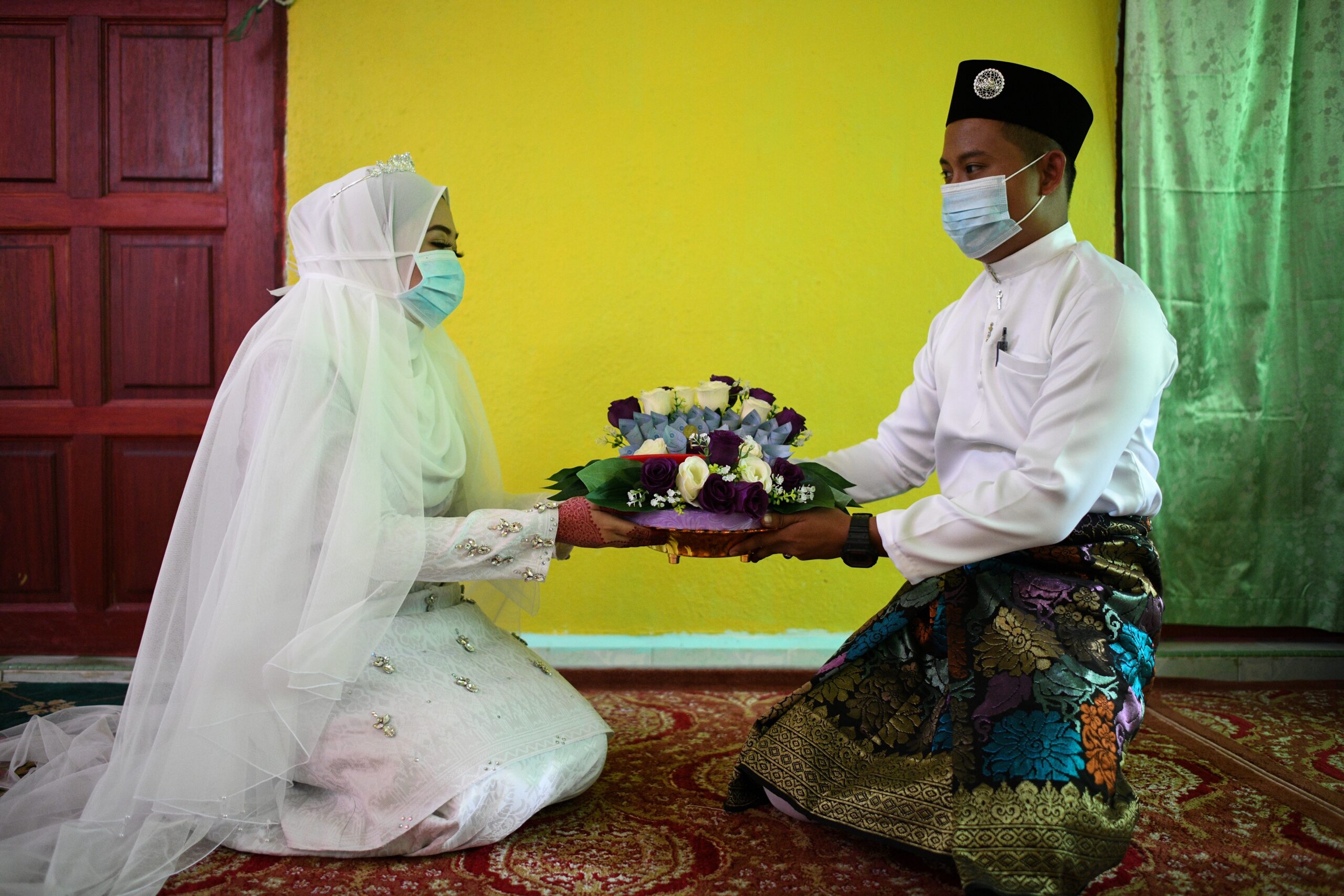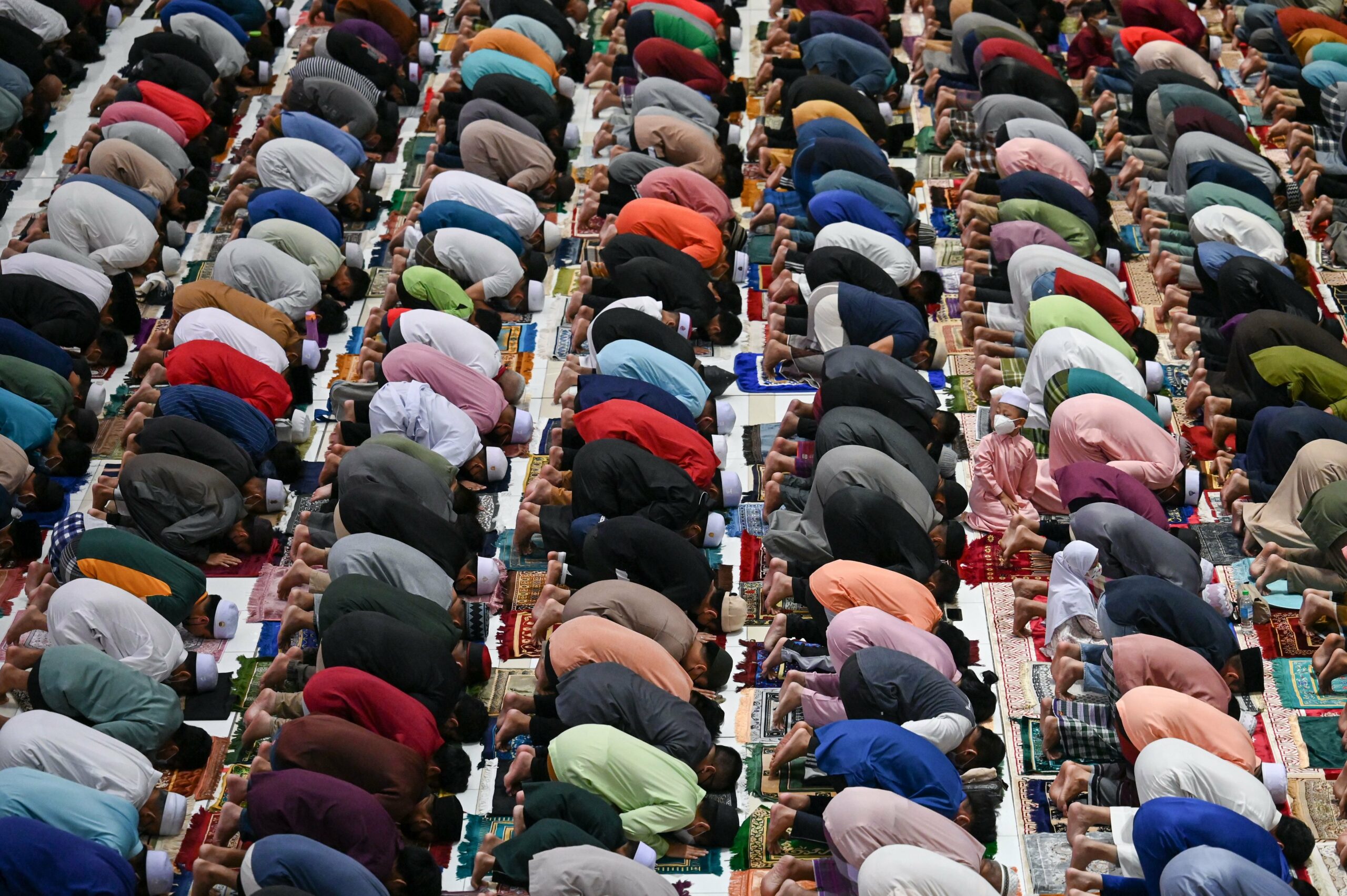When Afiqah* moved in with her boyfriend of two years, she suggested they each purchase a cheap ring so that neighbours would assume they were married.
Growing up Malay-Muslim in Malaysia, the 29-year-old is aware that living alone with her Chinese-Buddhist boyfriend can pose serious risks for her.
Under Malaysia’s Islamic law, known as syariah, unmarried Muslim couples can find themselves in trouble with state-religious authorities if they are found to be in close proximity, also known as khalwat. Syariah refers to the Islamic religious law, which has jurisdiction upon every Muslim in Malaysia. And some violations can mean up to six months in prison.
While Afiqah banks on her “ethnically ambiguous” looks, she and her boyfriend are still cautious of posting any photos of them on their social media, afraid that someone will report them living together. They are not unfamiliar with widely-reported cases of khalwat raids in the country.
“My family and friends have been very supportive of our relationship—they themselves are unconventional,” she said. “But I’ve heard horror stories from friends about being stopped by strangers. My boyfriend’s dad told us to be careful in case someone snitches on us.”
Afiqah’s anxieties about getting caught are not unwarranted.
Although Malaysia’s constitution ensures freedom of religion for its citizens of diverse faiths and ethnicities, Malaysia implements a dual legal system which allows certain states to maintain syariah courts concerning Muslims and Islamic affairs. In Malaysia, syariah is meant to govern areas of personal and family law such as marriage, divorce and inheritance.
However, cases that blur the line, such as judgements relating to inter-religious marriages, inheritance and religious conversions have led to certain confusion and crossovers where syariah courts’ jurisdictions can impact both Muslims and non-Muslims.

This was seen with the case of a Hindu mother, Loh Siew Hong, whose estranged husband converted her children to Islam without her knowledge. This however did not halt state-level religious authorities from attempting to deny her parental access to her children. Following this case, the Pan-Malaysia Islamic Party (PAS) president Abdul Hadi Awang in February heightened his calls for the secular Federal Constitution to be interpreted from what the party deems an “Islamic context.”
Yet this is not the only instance where state-practised syariah has begun encroaching into other aspects of everyday life for Malay-Muslims.
In recent years, religious affairs’ authorities such as the Department of Islamic Development Malaysia (JAKIM) have been ramping up investigations into sensitive content that is deemed insulting to Islam, calling for bans to long-standing cultural events such as the Japanese Bon Odori festival, and policing religious statuses of Muslim practitioners in the country.
In 2018, Hadi Awang, the president of the Islamic party PAS, had sought to increase syariah punishments to a maximum 30 years’ imprisonment, a $21,000 (RM100,000) fine and 100 lashes of the cane. Following the death of Queen Elizabeth II in September, the Federal Territories mufti’s office released a statement prohibiting Muslims from using the phrase, “Rest in Peace.”
“Moral policing happens when religious authorities, religious figures and religious communities are overzealous about how other people should or should not live their lives, regardless of whether there is a sanction for moral policing to take place,” said Rozana Isa, the Sisters in Islam executive director.
Sisters in Islam is a non-governmental organisation which advocates for the rights of Muslim women within the state implementation of syariah law. Isa fears that there may be a lack of concern among the general public, despite the impact it can have on everyday Malaysians and marginalised communities in the community.
“It is worse when there is provision in law, public institutions and bodies and public resources provided and facilitated for this moral policing to be implemented and enforced,” Isa said.
Moral policing happens when religious authorities, religious figures and religious communities are overzealous about how other people should or should not live their lives”
Rozana Isa, executive director, Sisters in Islam
She pointed to an illegal raid by the Federal Territories Islamic Department (JAWI) that occurred in 2016 that impacted Malaysia’s transgender community. In October of this year, the Islamic religious authorities also raided a Halloween party organised by the LGBTQ+ community in Kuala Lumpur, taking 18 Muslims to the JAWI office under offences of cross-dressing and “encouraging vice”.
“There is very little accountability of these authorities on how they conduct themselves during moral policing raids and any loss of limb and life as a result of these raids,” Isa said. In one khalwat raid, a man fleeing in fear of the religious authorities injured himself and fell to his death.
“Things are going to get worse because they are getting away with it,” Isa said, describing the fears of many Malaysians observing the development of their recent 15th general election. In the election that ran in November, the National Alliance, PN – of which the Islamic Party, PAS formed the highest component – clinched 73 seats, the second-highest after the multiracial Pakatan Harapan coalition (Alliance of Hope, PH).
Beyond the dichotomy
Malaysia’s implementation of moral policing and control is rooted in a deep colonial past. It’s also not specific to Malaysia, according to Shanon Shah, a sociologist who specialises on religious studies and a senior deputy editor for the London-based publication, Critical Muslim.
“These sorts of moral panic occur when there is a certain unease or discontent when societies are going through a period of change,” Shah said. He pointed to examples such as how the United Kingdom managed homophobia in the 1940s, or the demonisation of refugees and immigrants in many areas of the world.
“Let’s go beyond the religious-secular divide, and think about how enforcement and policing is tied into state-power structures—how policing is designed to prop up the status quo,” Shah added.
Isa believes that the increasing resurgence for stricter syariah laws may also be linked to the general elections in Malaysia. According to her, the political use of religious policing is not something new in Malaysia.
“Islam has been used as a political tool for almost 40 years now,” she said. “For as long as political parties continue to compete for support for political power and legitimacy from the majority Malay, Muslim constituents, Islam will continue to be utilised as a means for that power and legitimacy.”

“The reality is that no one would be unaffected as a result of laws and policies that are made based on religious grounds,” Isa added.
For Afiqah, such government policies affect her individual freedom, including when it comes to marriage with her non-Muslim boyfriend.
Although her relationship is strong, she explained, the conversion question looms over them. “There’s an assumption that there’s going to be conversion [to Islam] at some point,” Afiqah said, noting that religion was one of the first discussions that emerged when they started dating.
Afiqah has made peace with the likelihood of not ever marrying or bearing children with her partner. Her partner’s family live in constant fear of what might happen if the religious authorities come for the couple.
“I don’t want to force him to convert. The thing we resent about the discourse of mixed-race marriages in Malaysia, is that when conversion does happen, it’s phrased with the intention of showing how open Malaysia is to cultural differences,” she said.
“But people didn’t convert out of openness. They converted because that’s the sacrifice they have to make to be with the one they love. They have turned this really painful sacrifice into a standard, “multicultural Malaysia”, which obscures the reality of racial, religious supremacy.”


